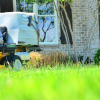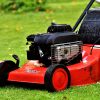If you have dogs at your home, you might leave your dogs free to run in the yard, especially if they’ve spent all day inside. It’s good for their physical health since running and walking around in the lawn is nothing less than exercise for them, but, unfortunately, it could also cause some serious health conditions, like infections and canine cancers. Read the article to learn more about how lawn chemicals can lead to canine cancer.
The Link Between Canine Cancer and Lawn Care Chemicals
Many lawn owners use fertilisers to keep their yard fresh and healthy. These fertilisers that keep grass healthy and thriving can also be hurting animals, including our pets. It may be assumed that fertilisers get washed away in heavy rain or get absorbed by the grass, but much of it can stick to the paws of free-roaming animals in the yard. The effect may not be immediately obvious, but the lawn chemicals can create some serious health problems once ingested or absorbed by animals.
Lymphoma and Lawn Chemicals
lymphoma in dogs is one of the major canine cancers caused by lawn care chemicals. This cancer mutates the white blood cell count, and when white blood cells increase beyond the normal amount, there’s an increased production of lymphocytes. These make any malignant tumours worse, causing eventual symptoms.
According to a study conducted at the Tufts University School of Veterinary Medicine proved that lymphoma in animals is correlated with some lawn care chemicals. This includes products like 2,4-Dichlorophenoxyacetic acid. 2 4-D is an endocrine-disrupting chemical, that is meant to kill off clovers and dandelions. When it enters into a dog’s body, it targets the thyroid and keeps the body from producing hormones that regulate normal functions such as white blood cell production.
If you are using fertilisers in your lawn, keep an eye on your pets, and always be alert for changes in their behaviour. Dog cancers typically display initial symptoms like weight loss, changes in eating, and difficulty swallowing. Noticing them early will help vets detect and diagnose our pets.
Bladder Cancer and Lawn Chemicals
Another main cancer caused by 2 4-D is the Bladder Cancer in dogs. This chemical compound increases the risk of this cancer, but it disproportionately affects different breeds. Breeds such as terriers, beagles and sheepdogs are more likely to get affected by this chemical and develop bladder cancer.
Not just spraying your lawns, but also keeping the chemical in your house or garage can be dangerous for your furry friends. Dogs don’t need to touch the lawn chemical for it to harm them. They might chew the fertiliser bag or inhale it after an opened bag falls over. And for those dogs who run around a treated lawn and go back in the house, the chemicals can get tracked inside and affect them.
Detecting bladder cancer can be a little hard for owners, as compared to the symptoms of lymphoma. The major symptoms of bladder cancer in dogs are blood in the urine, frequent urination, and pain when urinating. Take a good look at your dog’s urine from time to time, or else these symptoms can go unchecked for months while the dog continues developing a severe condition.
How to Take Better Care of Your Pets?
- Safer alternatives for chemical fertilisers
Do some research and learn about what your lawn needs to grow and choose the safest alternative for popular fertiliser brands. Your lawn and garden can still be thick and green without adding harmful chemicals.
- Test the pH of your soil
Test the pH level of your lawn soil. You can do this with the help of household vinegar and baking soda. The amount of foam produced will show where the soil level falls on the pH scale. If there’s minimal foam, the soil has a low acidic content. Compost or organic fertilisers can fix this quickly, whether the soil is meant to nourish grass or grow crops. If the pH levels are high, this indicates that the soil has high acidic content. You can treat this with the help of leftover coffee. Dilute the leftover cold coffee with water and pour it on the grassy areas to lower pH levels. Make sure this gets dry before dogs are let into the lawn, but once it’s been absorbed, stepping in that area won’t affect the dogs.
Make Your Lawns Safe for Your Pets
Keep your lawn and garden safe and thriving by preventing dogs from entering grass that has fertiliser residue in it, and choosing pet-friendly products for your lawn. Make sure your lawn is completely free from toxic chemicals, especially those containing 2 4-D, if you want to decrease the chances of your dogs developing canine cancers.
If you are confused about what safe products to use for your lawn and how to make your yard safe for your pets, then connect with a professional lawn care company. Express Mowing is one of the most reliable lawn care company in Australia, providing safe and affordable lawn maintenance service to our clients. Get in touch with us today.



